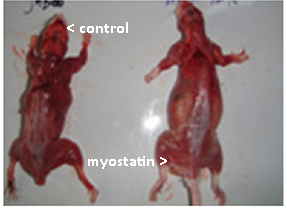Myostatin Blocker
Myostatin (also known as growth differentiation factor 8, abbreviated GDF-8) is a protein that in humans is encoded by the MSTN gene.[1] Myostatin is a secreted growth differentiation factor that is a member of the TGF beta protein family that inhibits muscle differentiation and growth. Myostatin is produced primarily in skeletal muscle cells, circulates in the blood and acts on muscle tissue, by binding a cell-bound receptor called the activin type II receptor.
Animals lacking myostatin or animals treated with substances such as follistatin that block the binding of myostatin to its receptor have significantly larger muscles. Thus, reduction of myostatin could potentially benefit the livestock industry, with even a 20 percent reduction in myostatin levels potentially having a large effect on the development of muscles.
However, the animal breeds developed as homozygous for myostatin deficiency have reproduction issues due to their unusually heavy and bulky offspring, and require special care and a more expensive diet to achieve a superior yield.
Myostatin Blocker

Myostatin Blocker
Myostatin (also known as growth differentiation factor 8, abbreviated GDF-8) is a protein that in humans is encoded by the MSTN gene.[1] Myostatin is a secreted growth differentiation factor that is a member of the TGF beta protein family that inhibits muscle differentiation and growth. Myostatin is produced primarily in skeletal muscle cells, circulates in the blood and acts on muscle tissue, by binding a cell-bound receptor called the activin type II receptor.
Animals lacking myostatin or animals treated with substances such as follistatin that block the binding of myostatin to its receptor have significantly larger muscles. Thus, reduction of myostatin could potentially benefit the livestock industry, with even a 20 percent reduction in myostatin levels potentially having a large effect on the development of muscles.
However, the animal breeds developed as homozygous for myostatin deficiency have reproduction issues due to their unusually heavy and bulky offspring, and require special care and a more expensive diet to achieve a superior yield.
Myostatin Blocker
Myostatin Blocker
Myostatin Blocker
Myostatin Blocker
Myostatin Blocker
Myostatin Blocker
Myostatin Blocker
Myostatin Blocker
Myostatin Blocker
Myostatin Blocker
Myostatin Blocker
Myostatin Blocker
Myostatin Blocker
Myostatin Blocker
Myostatin Blocker
Myostatin Blocker
Myostatin Blocker















No comments:
Post a Comment